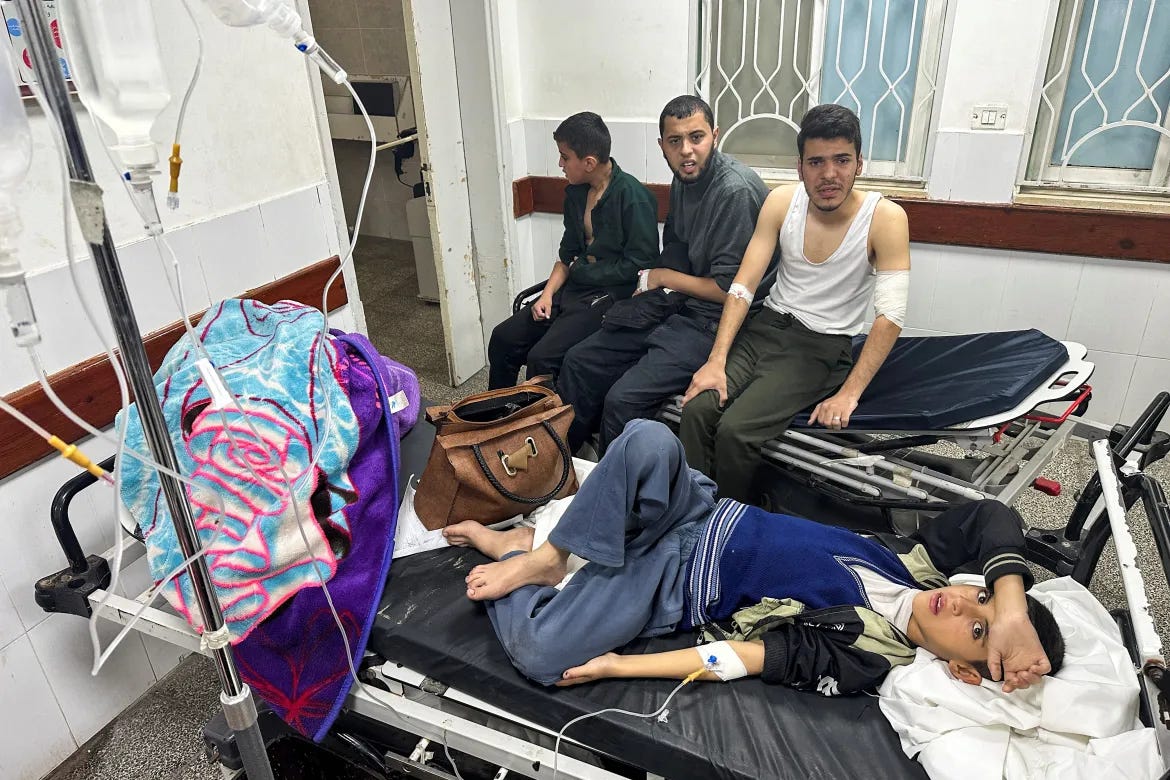
Albert Camus’ The Plague has come to Gaza.
What happens when you force 1.8 million people into a postage-stamp-sized territory and destroy or damage half of their dwelling places, breaking the water pipes with 2000-pound bombs? You create homeless people sleeping rough, with few toilets. Many people are forced to urinate and defecate in the streets.
The UN explains, “Due to the lack or limited capacity of latrines especially in IDP shelters, people are adopting unhealthy coping mechanisms, such as open defecation. In shelters, people wait for hours to access toilets, and in some other locations where IDPs [internally displaced people] are located, no toilets are available at all. Children reportedly defecate in the open, while adults resort to buckets and dispose of the waste in improvised areas or solid wate dumps. In many locations, solid waste is piling up with no effective waste management mechanism for collection or disposal. Reportedly, rats and insects, including mosquitos, congregate in these areas, contributing to the risk of spreading disease.”
Human waste carries bacteria and viruses. The winter rains come and spread around the urine and feces and bacteria and viruses.
Since many water pipes have been broken by the bombardment and anyway there is no fuel to pump the water through them, there is almost no potable water. People are drinking from puddles, which are contaminated. Most have no means of boiling the water collected from such puddles, so there is no way to make it safe.
“Well, personally, I’ve seen enough of people who die for an idea.
I don’t believe in heroism; I know it’s easy
and I’ve learned that it can be murderous. What interests me
is living and dying for what one loves.”
—Raymond Rambert, journalist, The Plague
The Palestinian Ministry of Health provided the following information, conveyed by the UN: “There have been significant increases or increased risk of outbreak in some communicable diseases and conditions such as diarrhea, influenza, chicken pox, meningitis, jaundice, impetigo acute respiratory infections, skin infections and hygiene-related conditions like lice and scabies. The heavy rains and flooding which affected large parts of Gaza on 13 December compounded human misery and added to the risk of waterborne diseases.”
Chicken pox and meningitis sound dangerous. Cholera is also being reported. Ironically, it is possible that these diseases will spread back into Israel through its soldiers.
Some of these diseases are especially dangerous to the little ones because, as Ministry of Health spokesman Ashraf Al-Qudra reported Thursday, the hospitals have completely run out of vaccines for children.
James Elder of UNICEF, just back from Gaza, explains that 100,000 children have diarrhea and 150,000 suffer from respiratory diseases. One physician on the ground told him that he expects the same number of children to die of disease as have been killed by Israeli bombing. Currently the latter are estimated at over 7,000, though that does not count the little bodies under the rubble.
I have no idea what’s awaiting me,
or what will happen when this all ends.
For the moment I know this:
there are sick people and they need curing.
—Dr. Rieux, The Plague
Elder calls this campaign a “war on children” because the proportion of children killed by Israeli actions has been twice that of other conflicts. He insists that Israelis are bombing indiscriminately, and frequently with dumb bombs rather than precision munitions. Indiscriminate fire that recklessly endangers the lives of noncombatants is a war crime. President Biden also complained this week about indiscriminate Israeli fire.
In the south of Gaza where a handful of hospitals are still trying to operate, often without medicines or functioning equipment, a Ministry of Health spokesman said that displaced individuals huddling in shelters had fallen ill and come for treatment. Among them, some 327,000 were diagnosed with infectious diseases. Apparently the doctors have run out of antibiotics to give them, according to Ministry of Health spokesman Ashraf Al-Qudra.
“I have realized that we all have plague,
and I have lost my peace. And today
I am still trying to find it; still trying to understand
all those others and not to be
the mortal enemy of anyone.”
—Jean Tarrou, idealist, The Plague




